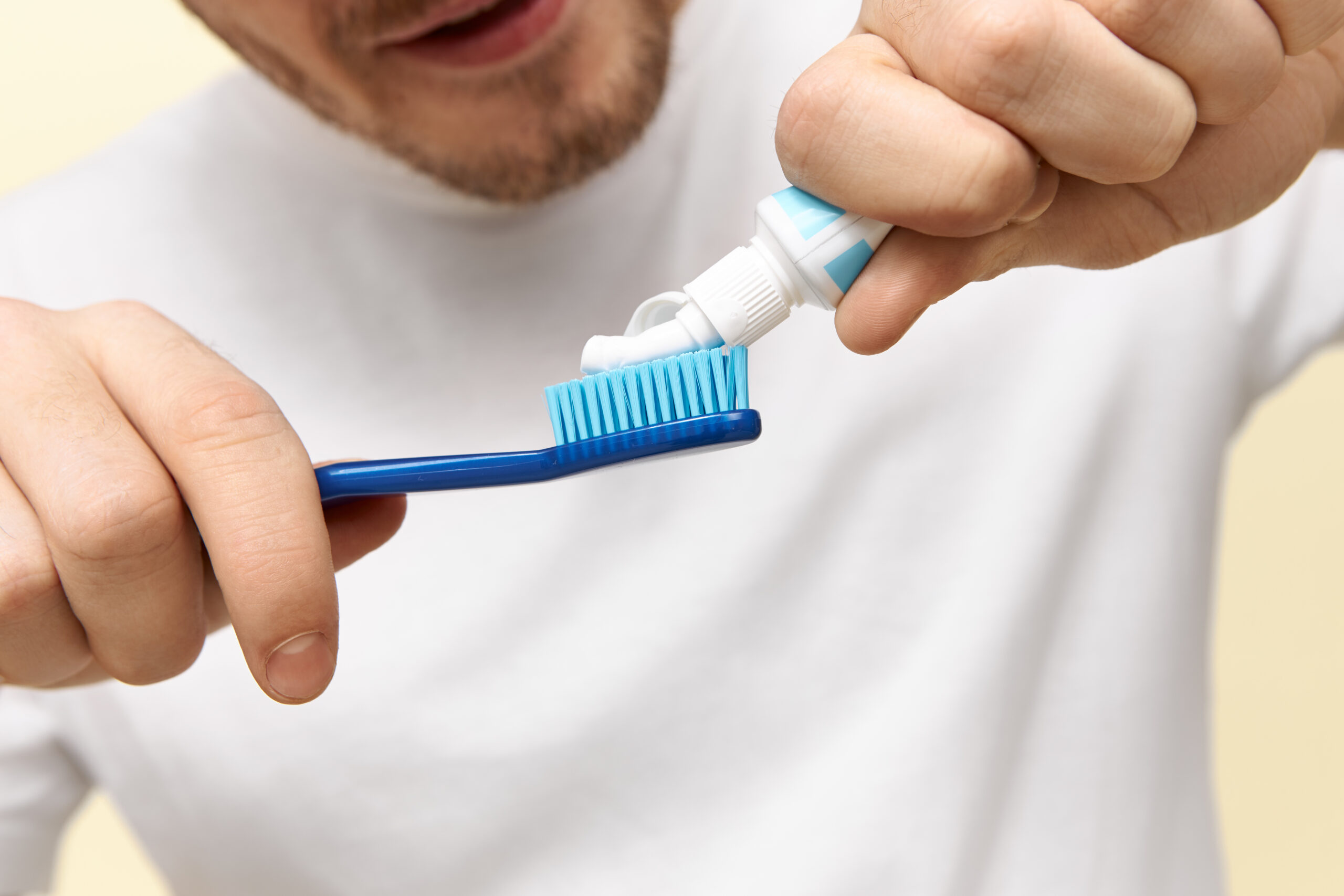Recently, TikTok has been buzzing with viral videos about using hydrogen peroxide as a home remedy for bleeding gums. From dental influencers to everyday users, many are swearing by its benefits for oral health.

As a result, “Hydrogen Peroxide for Bleeding Gums” has become a hot search topic on Google. But is it truly effective, or just another internet trend? In this blog post, we’ll explore what hydrogen peroxide is, why it’s being used for gum issues, how it works, how to use it safely, what the dentists say, and whether it’s a good long-term solution.
What Is Hydrogen Peroxide?
Hydrogen peroxide (H₂O₂) is a common household chemical made up of water and oxygen. You might recognize it as the clear liquid in brown bottles found in first-aid kits. It’s best known for its antiseptic properties and is often used to clean cuts and disinfect surfaces.
In diluted form, hydrogen peroxide is also used in teeth-whitening products and mouth rinses. Its bubbling action when it comes into contact with organic material is a sign of its germ-killing power, which is why it has gained popularity as a remedy for various oral health issues, including bleeding gums.
Why Are People Using Hydrogen Peroxide for Bleeding Gums?
Bleeding gums are often a sign of gum inflammation, or gingivitis, which is usually caused by plaque buildup due to poor oral hygiene. Some people also experience bleeding due to brushing too hard, hormonal changes, vitamin deficiencies, or more serious conditions like periodontitis.
Because hydrogen peroxide has antibacterial and anti-inflammatory properties, many users on TikTok claim it helps reduce bacteria in the mouth, soothe irritated gums, and stop the bleeding. The trend of swishing hydrogen peroxide around the mouth as a rinse has picked up steam, with many saying it gives fast results — often within just a few days.
How Does Hydrogen Peroxide Help with Bleeding Gums?
Hydrogen peroxide can support gum health in several ways. First, its antimicrobial properties help kill the bacteria responsible for plaque and inflammation. When you rinse with diluted hydrogen peroxide, it produces oxygen bubbles that remove debris and bacteria from between your teeth and below the gumline.
This deep cleaning effect can reduce infection and swelling, giving your gums a chance to heal. Second, hydrogen peroxide acts as an oxygenating agent, meaning it promotes increased oxygen levels in gum tissue, which can speed up healing. For mild gingivitis, this can result in a noticeable reduction in bleeding and discomfort over time.
How to Use Hydrogen Peroxide Safely for Bleeding Gums
If you’re planning to try hydrogen peroxide for bleeding gums, safety is key. The hydrogen peroxide sold in pharmacies is usually 3% concentration, which is too strong to use directly. You should always dilute it with water before using it as a mouth rinse. A common and safe ratio is one part 3% hydrogen peroxide to two parts water.
Swish the solution gently around your mouth for about 30 seconds, then spit it out — do not swallow it. You can use this rinse once a day, preferably after brushing and flossing. Avoid using it more than once daily unless directed by a dentist, as overuse can lead to irritation or damage to oral tissues.
TikTok Claims vs. Scientific Evidence
While TikTok has popularized hydrogen peroxide for bleeding gums, it’s important to separate viral claims from scientific truth. Many of the videos feature anecdotal success stories, but that doesn’t mean the solution works for everyone. Fortunately, scientific studies have shown that hydrogen peroxide can be effective in reducing plaque, gingivitis, and oral bacteria.
Dentists have long used hydrogen peroxide-based mouth rinses professionally for treating gum disease and whitening. However, research also warns against prolonged or excessive use, which can erode enamel and irritate gum tissue. So while the TikTok trend is based in truth, it should be practiced with caution and backed by proper oral care routines.
What Do Dentists Say About Hydrogen Peroxide for Gum Health?
Most dentists agree that hydrogen peroxide can be a helpful tool for managing bleeding gums — when used appropriately. Many dental professionals even prescribe hydrogen peroxide rinses as part of a treatment plan for gingivitis or after dental procedures. However, they emphasize that it’s not a substitute for regular brushing, flossing, or professional dental cleanings.
Dentists also caution against using it daily for long periods without supervision, as this can disturb the natural balance of bacteria in your mouth and lead to issues like tooth sensitivity or soft tissue burns. If your gums are bleeding persistently, dentists recommend seeing a professional to rule out more serious conditions.
Hydrogen Peroxide vs. Other Home Remedies for Bleeding Gums
Hydrogen peroxide isn’t the only home remedy for bleeding gums, but it has gained more attention recently due to its dual role as both a disinfectant and a healing agent. Other remedies people often try include warm saltwater rinses, oil pulling with coconut oil, tea tree oil toothpaste, and aloe vera gel.
Each of these has its own benefits — for instance, saltwater helps reduce inflammation, while oil pulling may remove bacteria — but hydrogen peroxide stands out due to its scientifically backed antibacterial and oxygenating properties. However, it’s often more potent than other options, which means it should be used with greater care.
Possible Side Effects of Using Hydrogen Peroxide in the Mouth
While hydrogen peroxide is generally safe in small, diluted amounts, it can have side effects if misused. Some people experience burning sensations, increased tooth sensitivity, or irritation of the gums if the solution is too strong or used too frequently.
Swallowing hydrogen peroxide — even in small amounts — can cause nausea or stomach upset, and in larger amounts, it can be toxic. There is also the risk of damaging the enamel or soft tissues if hydrogen peroxide is used undiluted or for long periods. It’s essential to listen to your body and consult with a dentist if you notice any discomfort or adverse reactions.
When to See a Dentist About Bleeding Gums
Bleeding gums shouldn’t be ignored. Occasional bleeding might be caused by brushing too hard or skipping flossing, but consistent or heavy bleeding can be a sign of gum disease or other health issues. If your gums bleed regularly, are swollen, red, or painful, you should make an appointment with a dentist.

Early-stage gum disease (gingivitis) can often be reversed with improved oral hygiene and remedies like hydrogen peroxide rinses. However, more advanced conditions like periodontitis require professional treatment, including deep cleaning, scaling, or even antibiotics. A dentist can help diagnose the issue and recommend the right course of action for your oral health.
Tips for Preventing Bleeding Gums
Prevention is always better than cure. Here are a few tips to help you avoid bleeding gums and maintain healthy oral hygiene:
- Brush twice a day using a soft-bristled toothbrush and fluoride toothpaste.
- Floss daily to remove plaque and food particles between teeth.
- Use an antimicrobial mouthwash (hydrogen peroxide is one option).
- Eat a balanced diet, rich in vitamin C and calcium.
- Avoid smoking, which weakens the gums and increases inflammation.
- Stay hydrated to maintain healthy saliva flow.
- Visit your dentist regularly for professional cleanings and checkups.
Hydrogen peroxide can be a useful addition to these practices but should not be your only line of defense.
Conclusion: Is Hydrogen Peroxide a Good Option for Bleeding Gums?
The rising trend of using hydrogen peroxide for bleeding gums has some merit. It’s affordable, widely available, and supported by scientific research for its antibacterial and healing properties. When used correctly and in moderation, hydrogen peroxide can help reduce gum inflammation, eliminate bacteria, and improve oral hygiene.
However, it’s important to treat it as a supplement to — not a replacement for — good oral care practices and dental visits. If your bleeding gums persist, it’s always best to seek professional dental advice to get to the root of the problem. So yes, hydrogen peroxide can help — but use it wisely.
Frequently Asked Questions (FAQ)
Can I use hydrogen peroxide every day for bleeding gums?
It’s best to use hydrogen peroxide as a rinse only 2–3 times a week unless directed by a dentist. Daily use can lead to irritation and enamel erosion.
What concentration of hydrogen peroxide is safe for the mouth?
Use 3% hydrogen peroxide diluted with water in a 1:2 ratio. Never use full-strength hydrogen peroxide in your mouth.
Is it safe to swallow hydrogen peroxide?
No. Hydrogen peroxide should never be swallowed. Always spit it out and rinse your mouth with water afterward.
How long does it take to see results?
Some users notice reduced bleeding and inflammation within a few days, but it may take a couple of weeks for full improvement with consistent oral hygiene.
Can hydrogen peroxide help with bad breath too?
Yes. Its antibacterial action can reduce the bacteria that cause bad breath, offering fresher breath as a bonus.
